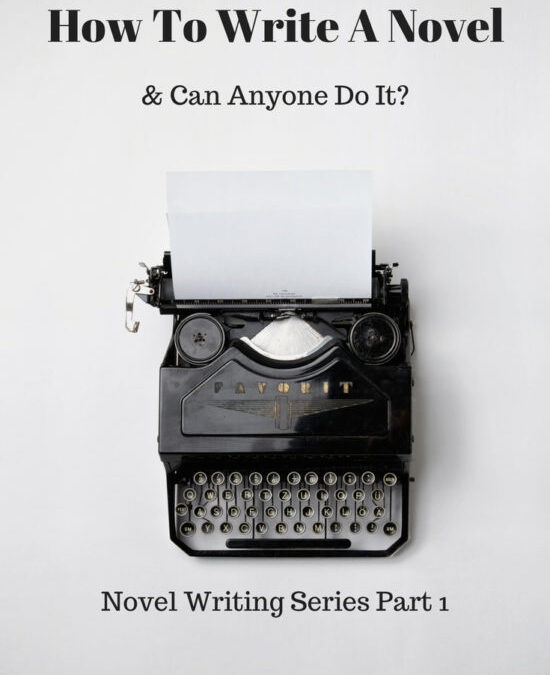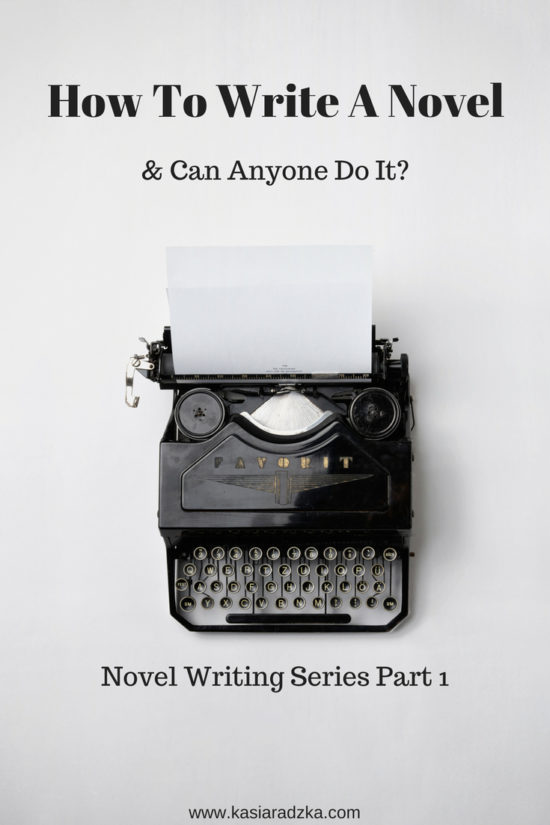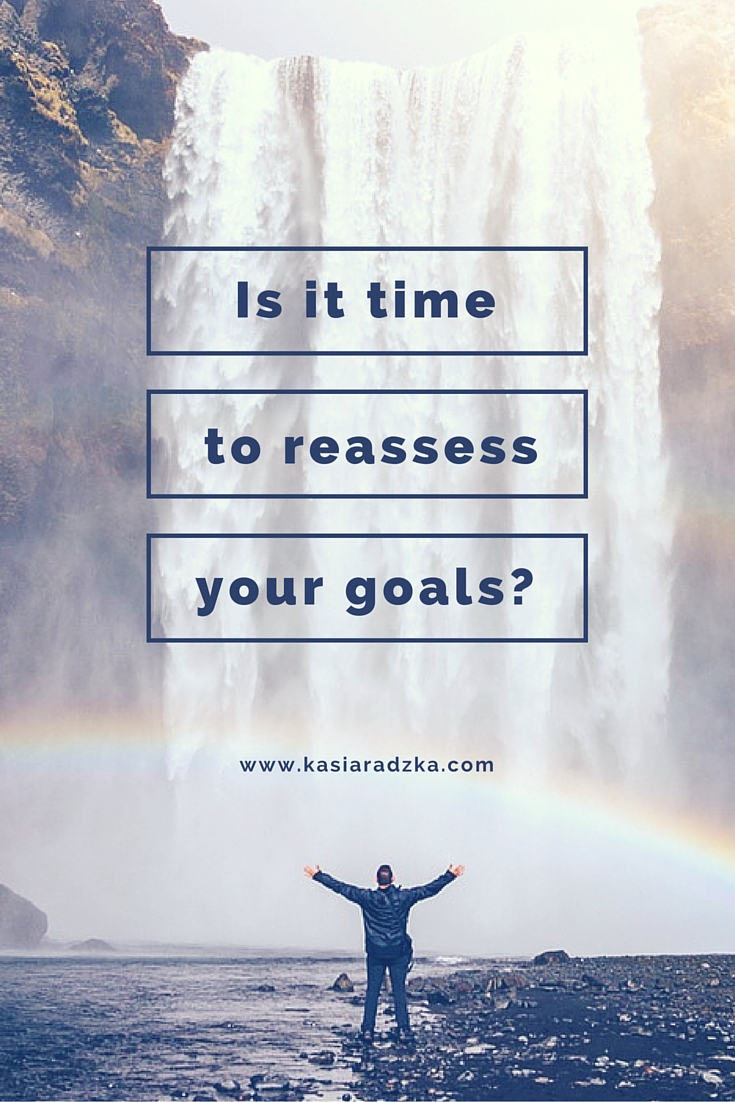
by Kasia | Aug 3, 2016 | Writing
Want to write a novel? Get your butt in the chair, fingers on the keyboard, and write away.
Writing a novel. It’s an item on the bucket list of many. But few will actually sit down and write that novel. It’s a shame because they could be the next JK Rowling or Stephen King and don’t even know it. Your first book is likely to suck but if you enjoy the process you might surprise yourself with the third or fourth and one day end up on the bestseller lists.

Writing a book is simple, but it isn’t easy.
“When asked, How do you write? I invariably answer, One word at a time.”
-Stephen King
Even for those seasoned authors who write a book per year. Each one is starting afresh, the same uncertainties hover around from the self-doubt to criticism, to how in the world am I going to get another idea. It’s natural, don’t worry about it, just keep going.
So how do you really write a novel?
It’s a question I still ask and I’ve so far published three books – one novel, two novellas. I’ve also written a dozen others in various genres over the past two decades (gosh I feel old!), and rightfully so, I threw them in the trash.
Is there a science to writing a novel? A formula? A technique?
There are so many books on the market on how to write one it makes new writers wonder if it’s as difficult as open-heart surgery. Is that why doctors become authors – they need a tough challenge? (Although I’d say after open-heart surgery everything else would seem easy).
Writing a novel is hard work. If anyone tells you different then they’ve either (a) never done it before, (b) are lying to you, or (c) have done it so many times that each book is the same.
Let me clarify.
Writing a novel is simple, but it’s hard work.
Every writer has a different technique to get the novel written. Some are procrastinators. Others pantsters. Some love to outline to the final detail. There’s no right or wrong way to do it. The only thing you need to realise is that your novel won’t get written unless you sit down and start writing it regardless of how talented you feel.
Talent is cheaper than table salt. What separates the talented individual from the successful one is a lot of hard work.
-Stephen King
Are you willing to put your butt in chair, start working hard and get writing?
Let me help you out here with a little pop quiz. Don’t worry I’m not going to grade you on it. But it might give you a better idea whether you’re actually in this for the long haul or just dreaming of fame and fortune. Either one is ok but only one has a guarantee.
Do you really want to write a novel?
No. Go do something else. I heard knitting can be fun.
Maybe.
Why?
You enjoy writing.
Awesome, keep going.
Money.
Hmm, chances of making a living are slim, getting loaded even slimmer.
Fame.
It’s like winning the literary lottery.
Entertainment.
Go for it, it’s entertaining coming up with how to kill your characters or make them fall in love with each other.
Challenge.
It certainly is. It also teaches you commitment. While it can take as little as a week to write a novel, generally it will probably take you twenty times that for your first one. Unless of course your special and you’ll have five books out in six months.
Yes, I really want to write a novel!
Awesome. What are you waiting for? It’s time to get started!!
-
Open the blank page. Start playing the ‘what if’ game. Start writing.
-
Outline your story. Add some quirky characters. Present three challenges. Start writing.
Keep writing. Finish the damn book.
-
Writing a novel is simple. It gets written one word, one sentence, one paragraph and one page at a time. It won’t happen overnight but it will happen.
-
Aim for one page per day. Can you do that?
-
That’s 365 pages in a year.
-
Let’s say a page is 250 words. That’s 91,250 words in 12 months.
Are they going to be good words? That’s not the point when you’re getting the draft down on paper. You just want to write it, purge it out of your system. Prove to yourself that it’s doable. Then move on to the next one.
A few years ago, maybe it was back in the 20th Century, I read a lot of ‘how to’ books, who am I kidding, I still read them. Anyway, I read a piece of advice about writing a novel. Anyone can do it, pick a book of your shelf and start copying page by page onto your word document. You’ve written a novel. Of course, you don’t want to be doing that but the exercise has some merit.
There are three elements that you need to write your novel:
A plot
Some characters
A setting
You could go deeper and consider the theme and subplots but these can arise organically through your writing.
Let’s take the romance genre as an example, it’s an easy one.
Boy meets girl or girl meets boy. They’re attracted to each other. Something or someone comes between them. They are separated. Then just when it seems impossible boy and girl reunite and live happily ever after.
Now fill the in the blanks. Who’s the boy and girl? Where are they from? What do they love/hate? How do they meet? Who doesn’t want them together? List five things that get in the way or add conflict to the relationship. What do they want from each other? From life?
Once you have a basic idea of your story you can start writing. How? Like Stephen King says, ‘one word at a time.’
The best way to learn is to write. Practice makes perfect – although I don’t think there’s anything that’s perfect and if we aim for that, especially as beginners, we’re bound to never finish anything.
With each book you write, and hopefully, you are in this for the long haul, you will improve. Sometimes it’ll be an action scene, the dialogue, maybe chapter cliffhangers, and then one day, the book you write will be like ‘wow, this practice makes perfect BS really does work’.
People will often say that they want to write a book and one day when they’ve got more time, retired, raised the kids, come back from holiday, got a better idea, they’d start writing. Most of them will never write a novel. There’s no ‘best’ time to write a book. If you really want to write one you will without making a single excuse.
Anyone can write a book, but not everyone will.
ACTION STEPS
- Commit to writing a page every day. If that seems like a lot start with half a page, a paragraph or even a sentence. Over time it all adds up. The point is to create a habit and fit it into work with your lifestyle. Some writers prefer the morning’s others need to burn the midnight oil. I write on my commute to the day job. I’ve drafted several novels by having that hour in the morning and afternoon to write, mind you, I don’t always meet my quota but as long as I get something down it is one step closer to finishing. A good day is 3000 words, a mediocre one is 500. Either way, it’s more words on the page than the day before.
- If you need motivation, grab a book from your bookshelf and type up the chapter. Obviously, this is for your personal use only. Type it up and note down the dialogue, the description, any flashbacks, action scenes. Use different highlighters. How does it all work? What sort of dialogue tags are used – said, whispered, asked?
- An editor recently told me I use a lot of the word ‘was’. Do a find on the word and see how many times it shows up. There are often better words to use to strengthen your scenes and your story. That one little tip made a huge difference to my self-editing technique and it’s something I’ll do before sending off my book for a professional edit.
Have you considered writing a novel? Written one already? Did you find it easy or difficult? What is holding you back?

by Kasia | Aug 2, 2016 | Writing
Do you write? Would you ever go as far as calling yourself a writer? Maybe you’re an ‘in the closet’ type of writer? Weekend only? Holidays? Monday through Sunday, early morning and late nights? Whatever type of writer you are, it’s time you own the title, it could change your life.
I’m a writer. I’m an author.
 It’s taken a while to own up to those terms. I might not invent a life saving machine or something on par with Branson’s out of this planet joy ride, but I’m doing what brings me a sense of satisfaction. How about you?
It’s taken a while to own up to those terms. I might not invent a life saving machine or something on par with Branson’s out of this planet joy ride, but I’m doing what brings me a sense of satisfaction. How about you?
Here are five ways to tell you’re a writer.
1 – You write every day (or once a week)
Writers write. They don’t talk about writing, they do it. Those that don’t generally like the idea of having been written but not the actual process. I like a bit of both but over the years I have learnt that the words aren’t going to write themselves, duh! So I try to write everyday whether that’s working on a novel, writing articles, blog posts or brainstorming plot development.
But writing everyday isn’t a necessity. We all have different lifestyles. Maybe you only have time on Saturday at 9am. That’s fine. You’re still a writer.
2 – You carry a notebook and pen in your bag along with your lap top
You never know when an idea will pop into your mind. Having both a laptop and notebook on hand means you’re prepared for any situation.
Only the other day I went to my weekly writing haunt, early morning sunrise on the beach and my laptop battery turned out to be dead. Fortunately, I had the trusty notebook and two pens, so the writing session did not go to waste. There’s also the Notes system on my smartphone, and the notebook by the bed. Let’s just say there’s always something to write on until an idea hits and I’m in a place where there’s nothing to jot the genius on.
Hold on, we live in the tech age, we’ve always got out trusty phones on us, don’t we?
3 – You’re constantly coming up with story ideas
Is your brain a well of ideas for stories, articles and books? Do you find yourself running out of hours in the day to get everything down on paper? You’re a writer. Own it.
At the moment there are ideas floating in my mind for three different series and it’s driving me crazy because I want to write them all like write now. That’s not possible. I did manage to outline an entire novel in the first book of one of the series on the hour train ride to work. Win!
4 – You have a journal, a blog, a website, ten unfinished manuscripts in the bottom drawer (or maybe just one)
Yes, you are a writer. Even if you haven’t been ‘traditionally published, you can claim the title. It’s no longer a closely guarded community. Writers are versatile, they are flexible, and they come from all walks of life in various shapes and sizes. From freelancer to author and blogger.
It doesn’t matter what you write, how you write it or when you write it, as long as you do.
You are a writer. Stop denying yourself the title.
5 – Your stories are the first thing you think of and the last thing before you go to bed at night
It’s hard to forget a project you are passionate about. Even when you’re not sitting down at your desk you are thinking about your story, mulling over the details and hoping your dreams might bring a resolution to the conflicts you have set for your characters. You are a writer.
I often go to bed early just so I can think about my characters and the nasty situations I want to put them into so they can fight to get out of them and come out stronger. Yes, I might be on the verge of mildly insane. Who isn’t?
What other ways might you tell that you’re a writer?

by Kasia | Jul 3, 2016 | Business, Self Publishing, Writing
 ‘There are only two certainties in life: death and taxes’ – Benjamin Franklin
‘There are only two certainties in life: death and taxes’ – Benjamin Franklin
For Australians, tax time is here.
Have you been a good record keeper the past twelve months?
While the chances of you being audited are slim Murphy’s Law says you’ll get audited just after you get lazy with your taxes. Just get it done right the first time and then sleep easy for the rest of the year.
The last thing you want to do is end up with a massive tax bill at the end of the financial year or the ATO (Australia) , HMRC (UK) or IRS (USA) or the equivalent in your country, knocking at your door demanding their money.
If you’re running a business you need to pay taxes. If it’s a hobby then you should be ok. But how do you know whether yours is a business or a hobby?
Good question.
It doesn’t come down to just how much money you bring in but also how you conduct yourself on a day to day basis.
Some questions to consider:
Do you have a business and marketing plan?
Is your intention to make a profit/run a business?
Are you putting in specific hours each week to work?
Are you selling your work for a profit or just to cover costs?
Do you promote your work?
If your intention is to turn a profit, then it’s likely that you are running a business.
Each country has different tax/business laws so make sure that you check out the rules and regulations for your area. Your best best is to give the taxation office a call or speak to a qualified accountant.
In Australia, the ATO website has an easy to use questionnaire that you can use to help you decide whether your venture will be treated as a hobby or as a business. You can check out the questionnaire here.
UK – Working for yourself?
US – Starting a business?
If you’re in Australia as I am, June 30 is the end of the financial year. Australians have till the 31 October to file their tax returns unless they’re registered with a tax agent.
Hopefully, you’ve overpaid rather than underpaid so they can get a nice refund to spend on a holiday or more books and stationery to fill their shelves. It’s like getting a little bonus without doing the extra work!
Deductions
If you’re a writer/author/freelancer who makes money and intends to make a profit rather than just to cover your expenses then you should speak to an accountant to ensure you are deducting the right things.
I love deductions. It’s all those little things that can reduce your tax bill significantly. Charity donations are the most common deductions that people use. Have you given money away to charity this year? Make sure that you keep a receipt for everything you’ve donated over $2. You can claim it at tax time.
As a writer making a dime you might be able to claim the following:
Toner and paper
Notebooks and pens
Internet connection
Subscriptions
Editor, VA and cover designers costs
Business Coaching
Professional development courses
A percentage of your phone bill
(I’m not a tax professional so this is just general advice. Speak to an accountant in your area who can assess your needs based on your activities and location. Different countries, different rules!)
Plan ahead
If you’re working for yourself then you’re probably already putting away a portion of your income to cover taxes. If you have a full time job and freelance on the side you should also be putting cash away for the tax man to collect.
* Put away at least 20% for taxes from your first payment
* Get an ABN (Australian Business Number) or the equivalent in your country. In Australia if you don’t have the ABN 49% of your income could be sent straight to the tax office.
*Do you need to register for GST (Goods & Services Tax)? If you’re earning under $75K then probably not. Planning on earning more? Check with your accountant.
*Keep all your receipts – you need to prove what you’re spending and deducting
*Record all your income and expenditure – you can click here to see what I use
*Maintain an invoice system
*Get an accountant!
If you’re not sure as to how much tax you should be paying each year, start putting aside 30% until you speak with an accountant. If you are able to forecast how much you anticipate earning then check out the tax brackets that apply to you. If your earnings fall below $18,200 (in Australia) then you won’t be paying any tax. If you plan on earning $35K, then start putting aside 20%, $80K, 35%, over $150K aim for 45% just to be on the safe side.
In the second year, the ATO will tell you how much you need to pay quarterly based on the previous year’s earnings. If you anticipate on earning more, make sure you put that little bit extra away so not to get bitten with a nasty tax bill come tax time. Your best bet is to speak to an accountant so they can advice you based on your personal circumstances. Their fee will be tax deductible the following financial year so keep your receipt!
No body likes paying taxes. Unfortunately, if you’re earning an income paying tax is inevitable.
How do you handle tax time? What are some things that you are able to deduct? Do you use an accountant or do you do your own?

by Kasia | Jul 3, 2016 | Business, Writing
 Come the first of the year and the world is busy setting goals, resolutions, objectives, or aims for the next 365 days where they hope to change their lives, grow happier, healthier, leaner, smarter, or richer.
Come the first of the year and the world is busy setting goals, resolutions, objectives, or aims for the next 365 days where they hope to change their lives, grow happier, healthier, leaner, smarter, or richer.
Trying to improve yourself as person in all areas of life is a good thing. Growth is healthy, it opens us up to opportunities, and removes the monotony of daily responsibilities.
The truth is that most people aren’t going to keep to their New Year Goals. Half will give up by the end of January, another half by March, and the majority would have thrown in the towel by the end of June. The few who do make it to six months are most likely to achieve their yearly goals and be better for it.
Where do you fall in the group?
If you’re on track, well done. You’re doing a great job. Keep at it. You can achieve anything.
If you’ve fallen off the bandwagon, it’s not too late to get back up.
Start today. You can do it!
June is the perfect time to reassess where you’re at, modify those goals if need be, and kick yourself up the booty and get cracking on those resolutions.
You’re not the same person today as you were six months ago. Ok you are, but the past six months you’ve have gone through new and old experiences, your needs may have changed, as well as your likes and dislikes. These might be just subtle changes but they may impact what you want from the year.
It’s ok to modify your goals to suit you today. They’re not set in stone so you can adjust and adapt to your current situation so that you get the best out of them.
Grab your list of goals (you’ve got them written down, right?).
Good, ok let’s get the party started.
4 QUESTIONS TO ASK WHEN CHECKING IN ON YOUR PROGRESS
1 – Read through your goals. Do you remember setting them as if it were yesterday? Or are you wondering what you were thinking when you wrote them down? Either way, go through them. Ask yourself, do they still apply today? Can any of them be modified to suit your current situation? For example, you might have set yourself a goal to read twelve non-fiction books but you’re just not getting any joy with them. Can you reduce the number to just three and increase the fiction ones? That’s not a sign of failure – it’s throwing realism into the mix and making sure that things get done.
2 – Which goals are you progressing nicely with? A few? None? Both answers are plausible. If you don’t read your goals regularly it’s easy to get distracted with life and every day tasks. Did you tell yourself you’re going to run a marathon at the end of the year? Have you been training as planned? Maybe just sporadically. Ask yourself why you’re not following to plan? It could be because it doesn’t suit your current lifestyle. What can you change to make it work for you today, this week, month? Think in smaller bits and you’re more likely to reach those goals sooner.
3 – Is there anything on your list that is completely ludicrous or not something that is in the realms of your control? Change it or lose it. Why set yourself up for disappointment? Winning the lotto is not a goal? Neither is earning your annual salary on the side if you haven’t bothered to hustle, hustle, and hustle some more the past six months.
4 – Are there any that you still really, really, really want to achieve? What do you hold dear to your heart? Fantastic. Having passion for your ambitions brings you one step closer to achieving your goals. What can you do today, right now, to bring you closer to that one goal that means everything to you? If you want to pick up a new language maybe it’s time to sign up for the course or find a conversation buddy online. Is there a client that you really want to nab for your business – take the plunge and cold call them with a pitch, or send them an email, or make an appointment to see them in person. What’s the worst that can happen?
Need help?
* Break down your goals
* Only do what you really want to do
* Find an accountability partner
* Focus on one goal per week or per month
* Get rid of the clutter – you don’t want your true goals crowded by false ones
It’s never too late to get a move on with your goals. Just remember to keep an eye on them throughout the year. Our minds find it hard to see the big picture especially when it’s in the distance.
Take bite size steps to achieving your goals even if they seem far away. Enjoy the journey and use what you learn to grow as a person and in your business. Sooner or later setting goals and achieving them will be a walk in the park.
I’m off to reassess my goals. It’s been a while. I too might need a kick in the backside to get things done this year.
Do you look over your goals regularly? What sort of steps are you taking to achieve them? Any tips on achieving your goals, whatever they may be?
![Should You Write A Book?]()
by Kasia | Jun 11, 2016 | Business, Self Publishing, Writing
 There are more than a million books being published each so why in the world would you want to add your own to the bunch? But the thing is, if you really want to write a book, you probably should.
There are more than a million books being published each so why in the world would you want to add your own to the bunch? But the thing is, if you really want to write a book, you probably should.
You may think its been said before, and yes, it probably has, but that doesn’t mean you said it, with your experience behind it, with a fresh perspective on it.
Pick up the latest issue of your favourite magazine and then find one from the year before. Take stock of the articles in each. Do they sound familiar? The same even? Yep, that’s right. Whether it’s health and fitness, gardening or cooking, real estate or parenting, the ideas are mostly the same, they simply have a different slant to them.
The same goes with books.
Whether you are writing fiction or non-fiction you will not find a book that is original. There are no more original ideas. Just fresh takes.
Romance books are all the same. Two people meet, they want to be together but there are multiple situations or people that get in their way, and then finally at the end they end up together.
Mysteries are generally solving a puzzle of who and why.
Books for writers generally repeat themselves but there’s no shortage of them coming out on a regular basis. The information is all the same just regurgitated in a different fashion.
Motivation books. Have you read the gurus in the field? I’ve found that most of their books end up sounding pretty much the same and yet people buy them. Love them. Recommend them to friends and neighbours.
Competition is good. But the good thing with books is that there’s no a limit as to how many you are able to read. That’s why there’s room for writers and authors of both fiction and non-fiction to find an audience for their work.
7 reasons why you should write a book:
1. A book can help you build a professional brand.
As a business, having a book on the market gives you a more authoritative voice. People will consider you and your business as an expert in the field that you are writing in.
2. A book can help increase your market reach.
A book will increase your market reach especially if it’s available from your website and any of the publishing platforms including Amazon, Kobo, iBooks, etc. If you want to reach more people with your business, writing a book might be a good option for you.
3. A book is a product that you can sell for many years.
You own the rights and can earn royalties until you die, which then they get turned over to your estate. Your book can continue earning even for up to 70 years after the authors/artists death.
4. A book is an additional income stream.
if you’re successful. While you should rely on one book to bring home the bacon, you will find that after book three you will start seeing more sales come through. Having a book, or better still, multiple books on the market, can be an investment for your financial future. A risky one, and not one you should rely on, but an investment nonetheless.
5. A book can be a sentimental keepsake for your family.
On a more personal note, it can be something you can pass on to family and friends. A keepsake of sorts, a sentimental piece of you.
6. A book may teach you something new.
Often the idea of ‘write what you know’ gets flipped around, but a better one is to ‘write what you want to know’. A book can give you an excuse to research all sorts of topics from forensic psychology or marketing tactics, to religion or the mafia.
7. You’re accomplishing a goal.
To prove to yourself that you can do it. Writing a book is simple but it’s far from easy. It requires time, dedication, small sacrifices and self-motivation. Trying to put on paper what’s in your head over three hundred pages whilst keeping the reader interested is hard work.
Maybe you’ve always wanted to write a book. It’s an item on your bucket list that you really want ticked off. Just go for it. Don’t wait for permission from anyone else. You might surprise yourself as to what actually comes out.
Having a book on the market can lead to many opportunities including meeting new people, travelling the world, public speaking, a new career, and so much more.
Have you written a book? Is it something you’ve ever thought about doing?
![Should You Write A Book?]()
by Kasia | Jun 3, 2016 | Blogging, Business, Self Publishing, Writing
May came, May went.
We won’t see May for another year. It’s been a surprisingly warm one for the sunny Gold Coast. It’s the end of Autumn at this part of the world but the temps have been sitting in the mid-20’s and dropping down to 15 at night (Celsius not Fahrenheit).
How was your May? Did you achieve your goals? Is there anything you wish you did differently that you’ll try in June?
May didn’t go according to plan. I set high expectations and,well, life including work, parenting, training for a marathon, exhaustion, socialising and a holiday got in the way of getting everything done. Ok, ok, I know, these are just excuses.
My main goal for May was to publish my third book, a novella, Lethal Aftershock. And I did that.
My secondary goal was to relax and have fun on my holiday to Fiji. I definitely did that. Maybe a little too much.
I took my laptop to get some writing done in between the sunbathing, drinking, running after my son in and out of the pool, paddle boarding, catching up on reading, eating and sleeping. Who was I kidding, I was in Fiji! Other than a few notes and questions that need to be answered in the next book, I didn’t do any writing until I got on the return flight and my brain started to work again.
Rest is a necessity. Sometimes working throughout a holiday is fantastic, at other times you need to stop, think about nothing and reset your brain. That’s what I did and it was worth it.
I’ve returned refreshed and ready to get back to work. I have learnt that I need to have a break otherwise I will burn out. My day job is mentally draining as is writing books. One deals with numbers, the other creativity. the end of the day, I am knackered.
I’ve found exercise is the best way to separate the two. A quick run or some weight training works wonders and makes the transition from day job to writing much smoother. If you need to jump from different activities a bit of exercise can make you more productive.
These were my goals for May, how did I fare. I’ll give myself a 5.5/10.
May Goals & Progress Report
- Publish Lethal Aftershock – YES!
- Write and schedule two months of blog posts. – YES!
- Send out 30 pitches. – No 🙁 Didn’t send any in May.
- Affiliates. No 🙁
- Run more. YES! Running about 3 times per week!
- Sell and giveaway 500 books. No 🙁 I gave away 18 and sold 8.
- Get 20 email sign ups. No 🙁 Currently sitting on 9.
The giveaway was a surprise. The last time I ran a free giveaway, I offloaded over 100 books without any promotions. 18 is a very disappointing number and I’m wondering what went wrong. I think the day I ran the promotion has something to do with it as did my lack of marketing.
This time around I ran the two-day giveaway on Monday and Tuesday. The only promo I did was mention it on Twitter once. The purpose of the giveaway is to attract readers and without marketing that just ain’t going to happen. Writing and they will come is not a good marketing strategy.
My first year was all about writing. The second year will be a combination of writing and marketing. I have grand goals, the only ones that are actually within my control are the productivity output. I control how much I write and what I write.
Writing is solitary but selling is a social activity. You need to connect with people in order to be successful.
Build relationships, help others, be of use, and quit bullshitting yourself.
Business By The Numbers In May 2016
Queries sent: 0
Responses: 0
Accepted: 0
Follow ups: 0
Income: $0
Books sold: 8 (Australia, US and Germany)
Books Given Away: 18
Income: $ $8.94
Total writing income: $8.94
June Goals
- Finish writing Lethal Attraction, the fourth book in the Lexi Ryder Crime Thriller series. I’ve got the skeleton down, now I just need to flesh the story out.
- Try Facebook ads. My initial budget will be $100.
- Be active on Goodreads. That’s very broad. I need to connect with more people (aiming for 10 in June). I also would like to join a discussion group. To date my usage involves adding books to my ‘to read’ list, writing reviews of books I really enjoy, etc.
- Finish the preliminary draft of a non-fiction book – Writerly Pursuits – this is a book for writers.
- Sell 100 books. This would be a sweet number. In order to do so, I need to work on my marketing skills!
- Submit 30 pitches for non-fiction work – personal finance, health & fitness, parenting, business, etc. Time to earn some extra cash to cover the costs of cover design and editing of book number four.
- Translate chapter one of Lethal Instincts into Polish. This is a personal goal. I want to prove to myself that I can do it. Fortunately the first chapter is nice and short!
- Start being more active in my social media groups. Comment on Facebook groups, be supportive of other writers, get onto Twitter and Instagram. The aim is to spend 5-10 minutes a day on each social media platform.
- Comment on three writers websites three times per week.
- Try my hand at podcasting/skype interview. I have someone I want to interview, and they have agreed to it. I’m about two months behind schedule and hoping they can still fit me in. So I need to figure out how to record on Skype, boost my confidence, and get interviewing!
- Get 20 email sign ups. This is a repeat from last month. Having an email list is very important, you just don’t know when platforms like Amazon are going to change their rules.
How was your May?
Did you achieve your personal and business goals?







